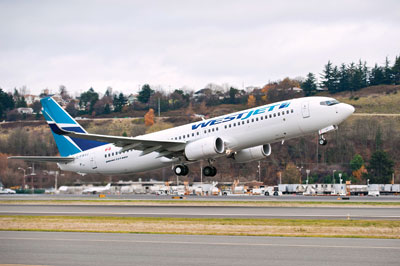
Features
Aircraft manufacturers
At The Gate: Building a future with Boeing
With sales of $68.7 billion in 2011, Boeing Co. is a behemoth. It does nearly $40 billion worth of business annually with more than 22,000 suppliers and partners globally and its 12,000 aircraft represent three quarters of the world’s fleet.
January 4, 2013 By Brian Dunn
With sales of $68.7 billion in 2011, Boeing Co. is a behemoth. It does nearly $40 billion worth of business annually with more than 22,000 suppliers and partners globally and its 12,000 aircraft represent three quarters of the world’s fleet.
 |
|
| Boeing has more than 200 major Canadian suppliers that enjoy about $1 billion in economic spinoffs annually. PHOTO: WESTJET |
Boeing has a major presence in Canada as well, employing more than 1,500 workers at facilities in Halifax, Montreal, Ottawa, Winnipeg, Calgary, Richmond and Vancouver.
It has more than 200 major Canadian suppliers that enjoy about $1 billion in economic spinoffs annually.
These figures were part of a presentation made at Aéro Montreal’s Global Supply Chain Summit last September called “Doing Business with Boeing.” Created in 2006, Aéro Montreal brings together all the major decision makers in Quebec’s aerospace sector, including companies, educational and research institutions, associations and unions. Its mission is to optimize the competitiveness of Quebec’s aerospace industry.
The September presentation outlined what Boeing looks for in suppliers and what the requirements are to get on the list. One requirement is that suppliers work closely with Boeing to deliver world-class products, goods and services and sustained high performance in cost, quality and delivery. Suppliers must also be financially healthy and lean, customer-focused, innovative and responsive. In addition, suppliers are judged on five levels of performance, from a gold standard for 100 per cent quality acceptance and on-time delivery to a low red standard for 98 per cent quality acceptance and 90 per cent on-time delivery. Boeing didn’t say what happens to a supplier that slips into the red.
Suppliers must also do their research to understand how their products and services can benefit Boeing and to share their commitment to performance excellence in terms of cost, quality and delivery. The company is also looking for suppliers who are financially healthy and focused on improving affordability and efficiency through lean operations and will share their knowledge on how to better manage both businesses and deliver value and solutions.
Another key prerequisite for a potential company to become a supplier is to understand Boeing’s procurement practices which govern the purchases of materials and stipulate that each Boeing business unit determine its own requirements. And when determining which suppliers to put on its bid list, Boeing considers a company’s location and size, capabilities and continuous cost improvements, among other criteria. In addition, Canadian suppliers must have ISO 9001 and AS9100 certification, a Proprietary Information Agreement and a Controlled Goods Directorate in addition to BEST code, Portal Access (Exostar access and Redars & Teamcenter) and DPM/MBD certification.
The best way to start the process is to log onto Boeingsuppliers.com. From there a supplier must register their company to access SupplierGATEWAY which is a Boeing tool to help collect accurate information about suppliers and their capabilities in a secure environment. This is important, because it puts a supplier in Boeing’s database and they may be contacted if a bid opportunity arises that matches their products and services requirements.
By requiring that each Boeing business unit determines its own requirements for procurement and selects its own sources of supply, the company emphasizes the importance of competitive bidding as a good business practice.
The supply chain portion of the total cost of an aircraft is increasing and represents 67 per cent of the older Challenger 850 program, 78 per cent of the newer Challenger 300 and 84 per cent of the latest CSeries program, according to another presentation by Louis Bouchard, senior business analyst, industry relations at Bombardier Aerospace. That presents a challenge to the company which has more than 1,700 suppliers in more than 70 countries.
To meet this challenge, Bombardier has a code of conduct that is incorporated into every amendment and new contract with a target of 100 per cent commitment to the code by suppliers in the next few years. In 2008, there were 20 suppliers committed to the code. By 2011, that figure had risen to 245 suppliers.
Bouchard says it’s important to be aware of a supplier’s operational performance at all times, to involve suppliers in strategic discussions through dedicated forums and to demonstrate that an OEM is committed to a supplier’s improvement by implementing supplier development programs.
What’s the best way to impress the Boeing brass? “Lead by example. Show your suppliers that you live by the highest standards,” says Bouchard. “Develop efficient communication channels with your supply base. Show your suppliers that you are willing to contribute to their development.
“Take advantage of continuous improvement programs and business processes to tackle social and environment issues and seize every opportunity with your suppliers to reinforce good behaviour through recognition programs.”
For Boeing, consistently striving for perfection is the only way to go.
Brian Dunn is a Wings writer and columnist.